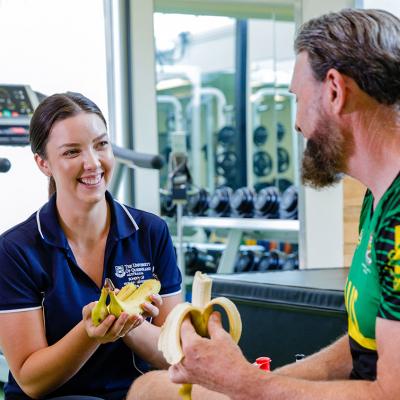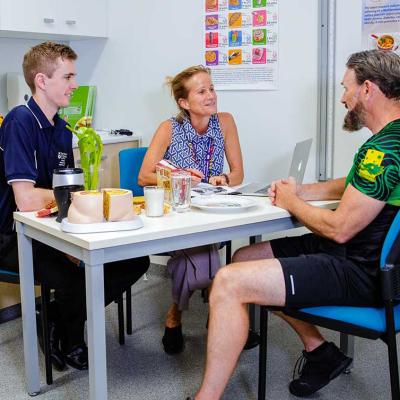Ever wondered how athletes stay at the top of their game? Behind every peak performance is a sports dietitian fine-tuning the fuel that powers success.
If you're passionate about nutrition and sport, becoming a sports dietitian could be your dream career. And since we're ranked #1 in Australia and #2 in the world for sports-related subjects by QS World University Rankings 2025, UQ is an excellent place to start your journey.
To dive deeper into the world of sports dietetics, we spoke with Dr Brooke Devlin, a Lecturer in Nutrition and Dietetics at UQ and an advanced sports dietitian. She shared her expert advice on what sports dietitians do and the steps you can take to break into this exciting and specialised field.
What do sports dietitians do?
Sports dietitians are experts in optimising athletes' performance through nutrition.
"A key part of our role is to provide personalised nutrition advice that helps athletes meet their specific training and competition goals," Brooke says.
"Beyond meal planning, sports dietitians provide hydration strategies and guidance on nutrient timing to optimise both performance and recovery.”
“Through these personalised approaches, we help athletes understand how balanced nutrition not only supports peak performance but also prevents injuries and speeds up recovery."
Sports dietitians may collaborate with professional athletes, sporting teams and elite fitness enthusiasts, but many also find opportunities in academic settings, research, and organisations such as gyms and healthcare facilities.
With the field constantly evolving, staying up to date with the latest sports nutrition research is crucial.
"Our advice must always be evidence-based and tailored to the individual athlete," says Brooke.

Steps to becoming a sports dietitian
Step 1: Earn an approved degree in nutrition and dietetics
To become an accredited sports dietitian in Australia, you must first qualify as an accredited practising dietitian (APD) with Dietitians Australia and then pursue accreditation with Sports Dietitians Australia (SDA).
To become an APD, you’ll need to hold an accredited dietetics degree that is recognised by Dietitians Australia (DA).
UQ offers various study pathways for you to become an APD.
Our fastest pathway:
*This program is in the process of seeking accreditation with Dietitians Australia, which will open up doors globally.
Undergraduate program pathways into the Master of Dietetics Studies:
- Bachelor of Human Movement and Nutrition Sciences
- Bachelors of Human Movement and Nutrition Sciences / Bachelor of Science (majoring in Food Science and Nutrition)
- Bachelor of Health Sciences
Postgraduate program:
Learn more about how to become an an accredited practising dietitian
Step 2: Apply for 'accredited practising dietitian' status and membership with Dietitians Australia
To practise as a dietitian in Australia, you need to be accredited by Dietitians Australia (DA), the national credentialing body for dietitians.
This process involves applying for accredited practising dietitian (APD) status upon graduation and meeting DA's professional and ethical standards. The DA website offers valuable information on student and graduate registration.
Students enrolled in accredited programs like the Master of Dietetics Studies can become student members of Dietitians Australia.
To maintain APD status, you must renew your registration annually and complete continuing professional development (CPD) activities to keep your skills and knowledge up to date. The DA website provides detailed information on registration renewal and CPD requirements.
Step 3: Gain practical experience
After earning your degree and becoming an accredited practising dietitian, building a strong foundation in general dietetics is crucial.
"It’s essential to start in general dietetics to hone your practical skills before specialising in sports nutrition," says Brooke.
She also encourages aspiring sports dietitians to seek out relevant opportunities.
Step 4: Pursue further qualifications in sports nutrition
Once you’ve gained experience as an accredited practising dietitian, the next step is to apply for the Sports Dietitians Australia (SDA) Sports Nutrition Course.
“This specialised training is designed for qualified dietitians who want to focus on sports and exercise nutrition," says Brooke.
"It equips you with the skills to develop tailored nutrition plans that meet the unique needs of athletes."
The course includes both coursework and practical assessments, providing the in-depth knowledge required to support athletes through personalised nutrition strategies. Upon successful completion, you’ll earn accreditation as an accredited sports dietitian with Sports Dietitians Australia, opening doors to work with athletes, teams, and sports organisations.
Step 5: Continue professional development
In the rapidly evolving field of sports nutrition, staying current is essential. Brooke highlights the importance of continuous learning.
"To remain at the forefront of sports nutrition, you must keep up with the latest research and advancements," she says.
Attending conferences, participating in professional development courses, and engaging with the broader sports nutrition community are all crucial for career growth.
"Networking with other professionals not only expands your knowledge but also helps build valuable connections in the industry," says Brooke.
An ongoing commitment to professional development will ensure you stay relevant and effective in supporting athletes' needs.
How much do sports dietitians make?
Dietitian salaries typically range from $65K to $88K in Australia, and this will vary based on factors such as experience, location, and whether you're working with professional athletes or in a more general setting.
Why become a sports dietitian?
Becoming a sports dietitian offers the chance to combine a passion for sport and nutrition, helping athletes perform at their best.
“We guide athletes to reach their full potential with nutrition tailored to their needs," says Madi, a UQ graduate and accredited practising dietitian.
"Even small adjustments can significantly improve energy, performance, and overall wellbeing."
The role is deeply rewarding, offering not just performance gains but long-term health benefits.
"Sports dietetics is about fuelling athletes for peak performance and long-term health," says Madi.
“It’s rewarding to help them build strength, maintain lean body mass, and perform at their best."
Madi also highlights the impact on club-level athletes who balance life, work, and sport.
"The small changes we make together often have a huge effect," she says.
"I love working with clients who see and feel the difference quickly, whether in their energy, performance, or just feeling better day to day."
With opportunities to work with both elite athletes and the broader community, sports dietetics blends a passion for sport with a drive to promote better health. Ultimately, sports dietitians empower athletes to thrive both in sport and in life.
"It’s about blending a passion for sport with promoting preventative health."
Explore UQ's Bachelor of Nutrition Sciences / Master of Dietetics Studies







